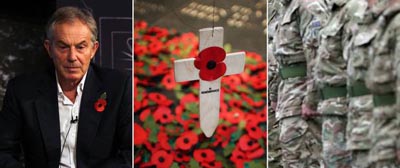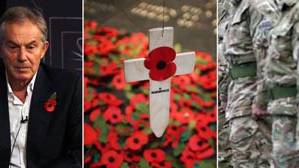Poppycock – or why remembrance rituals make me see red
Source: thetruthseeker.co.uk

On the briefest of visits to London, I was appalled to notice that our television presenters and politicians and dignitaries have almost all resorted to stereotype by wearing those bloody poppies again – even though I suspect most of them would not know the difference between the Dardanelles and the Somme. How come this obscene fashion appendage – inspired by a pro-war poem, for God’s sake, which demands yet further human sacrifice – still adorns the jackets and blouses of the Great and the Good? Even Tony Blair dares to wear a poppy – he who lied us into a war, which killed more people than the Battle of Mons.
I know all the reasons they give us. We must remember our dead. “They” died for us and our freedom. The cost of sacrifice. Remember Passchendaele. Never forget. At school I used to wear a poppy – without the leaf which now prettifies this wretched flower – and so did my Dad who, as I often recall, was a soldier of that Great War, in the trenches of the Third Battle of the Somme, 1918, and at Cambrai. But then, as 2nd Lieutenant Bill Fisk grew older and became sick, he read the biographies of that most meretricious of officers, Earl Haig – butcher Haig of the Somme, whose wife gave her name to the original poppies – and came to regard the wearing of these sickly and fake petals as hypocrisy. He stopped wearing the poppy for 11 November, and so did I.
At Ypres four years ago, I was honoured to give the Armistice Day lecture just before 11 November; but I did not wear a poppy and politely declined to lay a wreath at the Menin Gate – that “sepulchre of crime” as Sassoon called it – and I discovered, as the clergy purred away beneath the names of the 54,896 Great War soldiers with no known grave, a headstone atop the city’s old medieval wall. Nothing could equal the words which his family had courageously inscribed above the final resting place of 2nd Lieutenant Arthur Conway Young, who died on 16 August, 1917: “Sacrifice to the fallacy that war can end.”
So is there not some better way to remember this monstrous crime against humanity? The pity of war, as Wilfred Owen described it, must, for individuals, have a finite end, a point when time – looking backwards – just runs out. British men and women – and children – who visit the Somme battlefields and their vast cemeteries, still cry, and I can understand why. Here lies indeed the flower of youth cut short, only just over a generation distant. But we do not cry when we visit Waterloo or Agincourt. At Flanders Fields, the tears still flow. But not at Flodden Field. Who even weeps for the dead of the Boer War? No poppies for them. Only when you move into religious ecstasy can the long dead touch our souls. Watch the Christians walking the Way of the Cross in Jerusalem, or the Iraqi Shia remembering in the oven-like heat of Najaf and Kerballa the martyrdom of Imams Ali and Hussain. The tears splash down their clothes.
Perhaps in war, it’s the names that count. Dead soldiers had no gravestones before the Great War, unless they were generals, admirals or emperors worthy of entombment in Saint Paul’s or Les Invalides. The soldiery were simply dumped into mass graves. At Waterloo, the remains of the dead were shipped off to England to be used as manure on the fields of Lincolnshire – sometimes tilled, no doubt, by their unsuspecting farmer sons. So much for our remembrance of the “thin red line”. No posthumous glory for them.
Yet glory, I fear, does lie somewhere in our souls when we decide to bless our clothes with this preposterous poppy, this little paper and plastic “blood-drop” on our breasts, fake flowers that supposedly spring from the blood-red soil of the Flanders dead. It is perhaps easier to believe that the names will “live for evermore” – as it says on the walls of cemeteries of both Great Wars of the 20th century – even though hundreds of thousands of First World War Brits and French and Germans and Austrians and Irishmen in British uniform and Hungarians and Indians and Russians and Americans and Turks and, yes, even Portuguese (at Ypres) have no graves at all. But the poppy also helps us avoid a search for the meaning of war.
Wyndam Lewis, the master of Vorticist art who became a soldier at Ypres, wrote of the Great War that it “went on far too long… It was too vast for its meaning, like a giant with the brain of a midge. Its epic proportions were grotesquely out of scale, seeing what it was fought to settle. It was far too indecisive. It settled nothing, as it meant nothing. Indeed, it was impossible to escape the feeling that it was not meant to settle anything – that could have any meaning, or be of any advantage, to the general run of men.”
Tolstoy caught the other side of this “non-meaning” of war in his critique of Napoleon’s invasion of Russia. An “event took place”, he wrote in War and Peace, “opposed to human reason and human nature. Millions of men perpetrated against one another such innumerable crimes, frauds, treacheries, incendiarisms and murders, as in whole centuries are not recorded in the annals of all the law courts of the world, but which those who committed them did not at the time regard as being crimes.”
It was Lewis’s idea – that war was ultimately devoid of meaning – which my father was, I think, trying to capture when he described the 1914-18 conflict to me in his hospital room as “just one great waste”. He had survived that war and outlived another and the end of the British Empire, which I suspect we have not ceased mourning – could that be really what the poppies are all about? – and even lived long enough to watch the first Gulf War on television. He often quoted what he believed to be the last words of Nurse Edith Cavell, shot in Brussels by the Germans for rescuing Allied soldiers behind enemy lines, words which are inscribed on her monument beside the National Gallery: “Patriotism is not enough.” But in full, her very last words – spoken to a British chaplain before she was executed – were these: “But this I would say, standing in view of God and eternity, I realise that patriotism is not enough. I must have no hatred or bitterness towards anyone.” Read her words; and cast poppies aside.
[...]
Read the full article at: thetruthseeker.co.uk
Here’s David Cameron, proudly wearing his poppy and ‘connecting’ with the Royal Marines. “We must remember forever, not just for today,” he says.
The trouble is, does he remember? Does the nation remember? And what was the purpose of remembering? Was it not to remember the horrors and devastation of war? Was it not to celebrate the signing of the armistice? Was it not to learn from past mistakes, to ensure that present and future generations would never have to go through what our ancestors went through? If Britain’s leaders truly remember, why are they still so committed to militarism? Why have they spent £2 billion developing military drones over the past five years, with plans to spend a further £2 billion, while public services are being mercilessly cut? Why are British arms being sold to support Middle Eastern dictatorships? Why do soldiers continue to kill and be killed in needless wars in Afghanistan?
Or is it simply a sentimental, condescending pat on the head of the fallen and their relatives, a continuation of the glorification of war and violence as a way of resolving disputes? Through the rhetoric of honour and glory, they obscure the horrors and realities of war, and insist on creating new fallen heroes, even as they mourn the old ones.
Ben Griffin, an ex-SAS soldier, says,
“War is nothing like a John Wayne movie. There is nothing heroic about being blown up in a vehicle, there is nothing heroic about being shot in an ambush and there is nothing heroic about the deaths of countless civilians. Calling our soldiers heroes is an attempt to stifle criticism of the wars we are fighting in. It leads us to that most subtle piece of propaganda: You might not support the war but you must support our heroes, ergo you support the war. It is revealing that those who send our forces to war and those that spread war propaganda are the ones who choose to wear poppies weeks in advance of Armistice Day.”
It is worth bearing in mind that, as Laurie Penny points out, “not all of [the soldiers in the first and second world wars] bled willingly, for king and country; some of them simply bled because they had been seriously injured, because their leaders deemed it appropriate for them to die in pain and terror.” For government to talk reverently of “sacrifice” is to hijack the grief of veterans and their relatives to further their own jingoistic propaganda aims.
Source






















